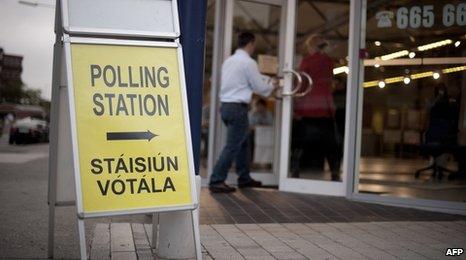Why is Ireland holding EU referendum?
- Published

On lamp posts across Ireland a battle's taking place, the result of which could decide the future of the European Union.
Brightly-coloured posters are hung in clusters, sometimes four or five high, proclaiming "Vote Yes" or "Vote No" to the Lisbon Treaty.
The treaty's meant to streamline the way the European Union runs now that it has 27 members.
But critics say it will mean individual nations giving away too much power to institutions in Brussels and worry that it'll create a "United States of Europe." Supporters deny that.
The arguments on both sides are passionate and Ireland's ended up being the battle ground as it's the only nation holding a referendum on whether its leaders should sign up.
Leaders of almost every other EU nation (with the exception of Poland and the Czech Republic) have already signed up to the treaty but all 27 countries must back it for it to take effect.
That means if Ireland votes no the treaty's all but finished.
In Julianstown, north of Dublin, hairstylist Aislinn Trodden, 28, says few of her clients have been talking about the referendum.
She said: "They haven't been talking to me about it anyway. I don't really understand enough about it though.
"They haven't told us enough about it, but maybe if every other country's backing it there must be something good in it."
The treaty includes changes to some of the EU's ways of voting, with more decisions taken by majority rather than unanimously.

Hairdresser Aislinn says not many of her clients have talked about the vote
Critics say that'll make it harder to block legislation you don't like, but it could also make it easier to pass plans you are in favour of.
There will also be closer foreign policy co-operation with a 'High Representative on Foreign Affairs', essentially a foreign minister, being appointed to speak for the whole EU on the world stage.
There will also be closer ties on issues of defence, justice and home affairs, though Britain's negotiated the right to opt out of much of this.
The treaty will also bring in a position of President of the European Council.
This will be a politician chosen to serve for a two-and-a-half-year term, and will replace the current system where each country holds the EU Presidency in turn on a six-month rotation.
Voting's taking place on Friday with the result expected on Saturday evening.